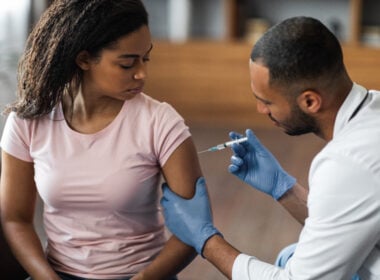As a UK-based medical doctor trained in the Creighton Model FertilityCare System and familiar with NaProTechnology, I know well the hurdles faced by fertility awareness-based method (FABM) instructors and restorative reproductive medical (RRM) providers—and their clients and patients—in the United Kingdom.
As a recent example, I just received an email from some of my clients, a couple to whom I am teaching the Creighton method, with the subject line: “Welcome to the newest member of our team!” The email contained a photograph of a centrifuge machine–a machine designed to separate red blood cells from the plasma in a blood sample. The couple had recently borrowed the machine to spin their own blood samples (obtained in a private clinic) at home. Why, you might ask, did they need to spin their own blood samples at home? Because they needed to send these samples to a private laboratory for evaluation—and the private lab would not accept samples through the mail that had not been through a centrifuge. The couple, who is working with a NaPro provider to investigate the cause of their infertility, accepted this hurdle in good humour, nicknaming the borrowed machine “Gianna,” after St Gianna Molla, the physician who gave her life in the 1960s to save the life of her unborn child.
This anecdote is an extreme example of the hurdles that are common in setting up (and accessing) FABM services and RRM care in the United Kingdom. While we have a National Health Service (NHS)—our one main healthcare provider which provides free healthcare for all who access it—it can be problematic when a woman or couple wants to seek something outside the standard protocols for infertility and gynaecological care. The following are some of the obstacles faced by both practitioners attempting to set up a FABM or RRM practice in the UK, and patients seeking restorative reproductive medical care for issues like infertility or menstrual cycle irregularities.
Even moderate costs seem exorbitant when everything else is free
While having 24/7 access to free healthcare has its obvious benefits, it can create a certain mindset in the user that all healthcare-related services should be free. Even when one is providing a healthcare service outside of the NHS as an alternative to the mainstream management of women’s reproductive health, or for infertility (like FABMs or RRM), there can be an expectation among patients that those things should be free, too. In addition, information about the actual costs of NHS-approved treatments is not widely available to users of the system, so there is no measure against which to compare the charge for FABM tuition (or RRM, if one can find it) to make a judgement as to whether a charge is reasonable. Unfortunately, being required to pay a fee for any form of healthcare against the backdrop of a free NHS proves a hurdle too much for some potential clients.
General Practitioners are the gatekeepers, and they lack understanding when it comes to FABMs and RRM
The General Practitioner (GP) or Family Doctor is the usual first point of contact for non-urgent healthcare issues in the NHS. If, therefore, while teaching a FABM we come across a gynaecological issue, we will first try and refer to the client’s GP. The reasons for this are twofold—firstly, in order to keep the GP involved in the care of their patient, and also because if the GP performs investigations based on what we have found in the chart, it is free for the client. Unfortunately, very few GPs have a good understanding of FABMs and of interpreting charts, and therefore seldom base any investigations or further care on those findings.
Patients are made to source—and pay for—all of their own tests
If the GP refuses to carry out any tests due to an abnormal chart finding, then it is for the client (or another practitioner on behalf of the client) to source these tests directly (hence the need for Gianna, the centrifuge machine!). Often this means approaching private laboratories and clinics and negotiating prices for blood tests, scans, and any other investigations. Again, as investigations are usually part of free NHS care, it can be a shock for the client to be charged even moderate prices for blood tests, scans, and any other investigations, and this can prove a deal-breaker—especially if the condition being diagnosed and treated requires multiple investigations.
The NHS is protocol-driven, and without NHS buy-in for FABMs and RRM, changing perceptions and increasing access will be difficult
One of the key features of the NHS is that it is heavily protocol-driven, and that brings difficulties when trying to use a different management approach outside of the NHS-sanctioned protocols. Typical NHS management protocols for gynaecological problems involve hormonal contraception (namely the birth control pill or an IUD), and the NHS will even pay for IVF for certain individuals with infertility. FABMs and RRM are not part of NHS protocols to deal with gynaecological problems or infertility, so it is difficult to get GPs to engage with this approach.
Currently, no UK-based practitioners can afford to provide RRM services—which is why the nearest provider is in the Republic of Ireland!
Even if a FABM instructor can engage with a client, successfully teach a method, and help a client get the relevant investigations to confirm a diagnosis, the next step of referring to a RRM provider is often the biggest hurdle—in fact, our nearest practicing NaPro and RRM doctors are in the Republic of Ireland! Therefore, a trip abroad is required (with all its associated costs) in addition to the cost of the treatment. There are UK-based, trained RRM doctors, but again, due to the protocoled nature of the NHS, anything outside of those protocols is seen as “alternative” medicine, and therefore a practice in RRM is difficult to get appropriately indemnified for. Indemnity is either not possible at all, or extremely expensive at a cost that is unlikely to be offset by the relatively low numbers of clients who at present would want RRM. This is a one of the major reasons why none of our UK-based, RRM doctors are able to afford to practice—even though they are trained and interested in providing these services.
Providers and practitioners of different FABMs aren’t working together
Another barrier in the UK is the lack of engagement and partnership between FABM providers— particularly providers of the different methods of fertility awareness or natural family planning. It is not entirely clear why this is the case. With more collaboration, providers could offer mutual support to each other, they could share knowledge and new research, and through this, build up public trust in FABMs and in the RRM approach. A new and more widespread desire from the public for FABMs and RRM could encourage the NHS to develop protocols to offer these approaches.
Despite these obstacles, we still have hope for the future of RRM and fertility awareness in the UK
While there are many hurdles faced by FABM practitioners and RRM providers in the UK, they are not insurmountable. We have seen some progress compared to where we were, for example, 10 years ago. There are many people within the UK and Republic of Ireland who have successfully navigated learning and using a FABM, and receiving treatment using a restorative reproductive medical approach, even within this difficult environment. There is still a lot of work to do, but hopefully, as awareness and uptake of FABMs increase, it will become easier to overcome some of these roadblocks.
Amanda Buadi is a UK-based medical doctor and a trained Creighton Model FertilityCare Practitioner. She owns and operates Wholly Natural Fertility, where she teaches women and couples in the UK the Creighton fertility awareness method, and helps them obtain restorative reproductive medical care where possible.
Amanda’s article is part of our new “Going Global” initiative at Natural Womanhood, which you can learn more about here.
Additional reading:
IVF and Restorative Reproductive Medicine Stories: What they have in common, and how they differ
Endometriosis and Autoimmune Disease: What’s the Connection?
Why is Male Reproductive Health Declining?
Progesterone Helps Prevent Miscarriage: Good News for Moms and Babies
An open letter to Melinda Gates on contraceptives
UN Urges Further Reliance Upon Contraceptives, While Pandemic Highlights their Unsustainability











